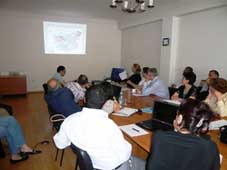Caucasus countries put rivers above politics
By Sopo Datishvili
Thursday, June 25

Ongoing work on the Aghstev, Debed/Khrami, Aragvi, Alazani/Ganykh and Ganjachai basins was discussed. Joint monitoring data, discussed twice already, were analysed again. The specialists from Baku, Yerevan and Tbilisi also defined their future work plans. Joint monitoring, controlling the cross-border rivers and combatting water pollution are the short term work priorities. All parties agreed that river water doesn’t have boundaries and the three neighbouring countries are equally responsible for it, and that this shared responsibility transcends any kind of political disagreement.
The team leader of the project, Dr. Anatoly Pichugin, is glad that the cooperation of these Caucasian countries in this project has proven successful. “One of the main challenges for our project was to make these countries speak one language concerning cross-border waters. They have full independence in their work but at the same time they work together. This work is above all politics. The Kura-Aras is in the heart of the region and is surrounded by a unique Caucasian ecosystem. Imagine that one day Kura disappears, what will happen? So Georgia, Azerbaijan and Armenia should care for their rivers together.”
Anatoly Pichugin also highlighted that public awareness in crucial in fighting water pollution. He said the project also tries to explain to people in a simple way the hazards connected with polluting river water. “We try to explain everything in a simple European way because if public awareness is sufficiently great, people can influence the decisions of their Government,” he added.
Representatives of the Georgian Ministry of Natural Resources and Environmental Protection were also present at the workshop. The head of the Integrated Environment Department, Paata Chipashvili, talked about the importance of the joint monitoring in the region. “We want to have clean rivers in the Caucasus. Our joint work will bring us nearer to European standards. We control our rivers and then compare results. Since the transitional period [the 1990s] environment protection hasn’t been a priority for the people. The people, not informed appropriately, are the biggest enemy of nature. Now we are working on this. This project granted the Ministry all the necessary devices and laboratories for controlling water quality. This will help us get closer to European standards in the near future.”
Peter Roncak, the water quality monitoring and river basin management specialist of the project, seemed satisfied with two-day-workshop and underlined the topics which should be taken into consideration in future work. “First of all they should manage their data information flow and then jointly define the issues affecting the cross-border rivers and how to manage river resources. This isn’t an easy job and it requires a consensus between the three countries. Also a lot is up to the decision makers.”
Jesper Ansbaek, the river basin management specialist of the project, highlighted the necessity of creating a comprehensive database on cross-border rivers. “This will be the base on which future monitoring of the rivers will be conducted, but first of all we need the right information to put into this system, so they countries have to work on this as well. They should also get acquainted with each other’s operational principles, so the results of their joint working improve,” he added.
The organisers promised to arrange a similar workshop in September. The EU-funded ‘Cross-Border River Management Phase II for the Kura River Basin – Armenia, Georgia, Azerbaijan’ project started in 2008 and will last for 30 months. Its major aim is to help the Caucasian countries improve cross-border cooperation and adopt European methodology.
